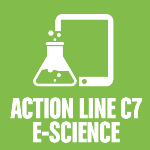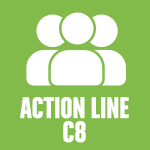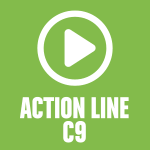Media and Information Literacy empowered by Artificial Intelligence for Diversity and Disaster
International Federation for Information Processing (IFIP) and United Nations Educational, Scientific and Cultural Organization (UNESCO)

Session 146
Seeking for ICT use in diversity and disaster response
IFIP organized the workshop on Digital Euqity and Inclusion for ICT in Disaster Resk Reduction at WSIS2018 last year with speakers from UNESCO and UN Women. This time as our second trial we have the workshop with the same members from the last year as well as with new participants. This time we look into media and information literacy empowered by AI for diversity and disaster. Recent literature discussed diversity computing and the importance of developing systems “by design” from the diversity viewpoint [1]. Regarding disaster, IFIP has organized the conferences on IT in Disaster Risk Reduction (ITDRR) since 2016. Inclusion issues for disaster communications were introduced [2] at ITDRR2017 held in October 2017 in Bulgaria. In this workshop, we have speakers from UNESCO who are working on media and information literacy empowered by AI for children at disaster. Another speaker from UN Women working on diversity aspects. We also have some other speakers working on diversity and disaster. All together, we would like to present media and information literacy issues in terms of diversity and disaster. We are planning one more speaker from NPO, Pangaea, who is working on diversity issues in the developing countries [3].
References
[1] Fletcher-Watson et al.: Diversity Computing, ACM Interactions, vol.25.5, pp.28-33 (2018).
[2] Malteser International: "Barrier-free" - Including people with disabilities in disaster prevention in Myanmar, introduce at ITDRR2017 (2017) YouTube: https://www.youtube.com/watch?v=uzSKfx2sbdY
[3] Pituxcoosuvarn, M. et al.: Supporting a Children's Workshop with Machine Translation, IUI Companion 2018: 32 (2018) https://dl.acm.org/citation.cfm?doid=3180308.3180341
Moderator
Yuko Murayama
Speakers/Panellists
Yuko Murayama (Vice President, IFIP) : Introduction to the workshop as well as Introduction to IT for Disaster and Diversity and Inclusion
Masatoshi Hamada (Invited Researcher, Université Paris VIII) and Alton Grizzle (Programme Specialist, UNESCO): How to solve real social difficulties on UNESCO #MIL Cities
Toshihisa Nakamura (Programme Analyst, UN Women): The Gender Inequality of Risks and Inclusion for Disaster Risk Reduction and Resilience through ICT
Yumiko Mori (Chairman, NPO Pangaea and Pangaea Kenya): Challenge to Prevent Extreme Violence with soft approach utilizing ICT - SDGs 4.7 Global Citizenship Education Approach by NPO Pangaea and JICA in Kenya
Panel: Media and Information Literacy empowered by Artificial Intelligence for Diversity and Disaster
Session's link to WSIS Action Lines
-
 C2. Information and communication infrastructure
C2. Information and communication infrastructure
-
 C3. Access to information and knowledge
C3. Access to information and knowledge
-
 C4. Capacity building
C4. Capacity building
-
 C5. Building confidence and security in the use of ICTs
C5. Building confidence and security in the use of ICTs
-
 C7. ICT Applications: E-learning
C7. ICT Applications: E-learning
-
 C7. ICT Applications: E-health
C7. ICT Applications: E-health
-
 C7. ICT Applications: E-employment
C7. ICT Applications: E-employment
-
 C7. ICT Applications: E-environment
C7. ICT Applications: E-environment
-
 C7. ICT Applications: E-science
C7. ICT Applications: E-science
-
 C8. Cultural diversity and identity, linguistic diversity and local content
C8. Cultural diversity and identity, linguistic diversity and local content
-
 C9. Media
C9. Media
-
 C11. International and regional cooperation
C11. International and regional cooperation
Our workshop theme this time is related fully with: C2, C3, C4, C7(E-learning, E-health, E-employment, E-environment and E-sicence), C8, C9 and C11 as follows:
C2. Information and communication infrastructure
C2 is concerned with accessibility, affordability and inclusive issues, it is related to our workshop theme directly. The issues in the action line C2 includes infrastructure as well as education so that it is related to the preparation phase as well as emergency response phases just after the disaster. Also such infrastructure is basis for media literacy.
C3. Access to information and knowledge
This action line is concerned with access to knowledge and information in public domain and is related to our workshop theme directly. C3 could be concerned with all the issues of our workshop theme. It is related to literacy issues for diversity and disaster. AI is closely related to access to information and knowledge as well.
C4. Capacity building
This action line is concerned with education and training both inside and outside formal education. This is concerned with media and information literacy for diversity and disaster and is fully related to our workshop theme.
C5. Building confidence and security in the use of ICTs
This action line is related to our workshop theme in an interesting way that while availability of information is more important than privacy and security at the learning phase of media and information literacy for diversity and disaster, however, once one obtains literacy and use it, one has to be aware of privacy and security issues. In fact, we need to provide enough information on security and privacy as a part of media and information literacy.
Moreover, trust is related to our workshop theme as it is one of keywords for disaster communications between supporters with heterogeneous backgrounds. Another important aspect of trust is the trustworthiness of information itself. At disaster, we may have reliable information while we may get misinformation as well; the question is who would judge whether information is trustworthy or not. Trust issues may well need to be incorporated in media and information literacy.
C7. ICT Applications: E-learning
E-learning is described in C4 and related closely to our workshop theme.
C7. ICT Applications: E-health
E-health is concerned directly with disaster victims and related closely to our workshop theme. It would strengthen and expand ICT-based initiatives for providing medical and humanitarian assistance in disasters and emergencies and related to the emergency response phase as well as the preparation phase for education and training.
C7. ICT Applications: E-employment
Media and information literacy could provide diverse people with employment opportunities. Moreover, local government who lost officers by disaster may well need more supporters or employers outside the disaster area such as information provision and processing so that they can telework at the emergency response and recovery. Victims who lost jobs need to get back to work possibly by telework for a company outside the disaster area. Women with ICT knowledge were very helpful at temporary housing at the recovery phase in Japan seven years ago. Such a diversity aspect is related closely to our workshop theme.
C7. ICT Applications: E-environment
E-environment provides monitoring systems, using ICTs, to forecast and monitor the impact of natural and man-made disasters at the prevention and preparation phases of the disaster management cycle. This aspect is related closely to our workshop theme.
C7. ICT Applications: E-science
E-science promotes Internet connection for all universities and research institutions to support their role in information and knowledge production, education and training, and to support the establishment of partnerships, cooperation and networking between these institutions even at disaster response and recovery phases. It also promotes electronic publishing and open access initiatives to make scientific information accessible in all countries on an equitable basis and promotes principles and metadata standards to facilitate cooperation and effective use of collected scientific information and data as appropriate to conduct scientific research on media and information literacy empowered by AI..
C8. Cultural diversity and identity, linguistic diversity and local content
Cultural and linguistic diversity, while stimulating respect for cultural identity, traditions and religions is very important for media and information literacy for diversity and disaster. Eight years ago, in Japan, we could not make it fully to use the Sahana system [1], partly due to the localization with Japanese language [2]. Moreover, main disaster managers are local government officers who had a culture (not in the sense of culture in the nation) that it is familiar for them to use a certain software, Excel. That sort of local cultural aspect is important with information systems at disaster.
[1] Currion, P., Silva, C. and Van de Walle, B: “Open source software for disaster management”, Comm. of the ACM, 50, 3, pp.61-65, 2007
[2] Yoshino, T. et al.: “Operation and evaluation of a disaster relief information sharing system”, Sahana at the Great East Japan Earthquake, Journal of digital practices, IPSJ, 3(3), 2012, pp177-183, in Japanese, 2012
C9. Media
This action line is important to disseminate information and related closely with our workshop theme. We look into the media and information literacy empowered by AI for diversity and disaster. We shall try and discuss what the issues in the media and information literacy are in terms of diversity and disaster at the workshop.
C11. International and regional cooperation
International cooperation among all stakeholders is vital in implementation of this plan of action and needs to be strengthened with a view to promoting universal access and bridging the digital divide, inter alia, by provision of means of implementation. C11 is related fully to our workshop theme in terms of diversity and disaster.
Session's link to Sustainable Development Process
-
 Goal 4: Ensure inclusive and equitable quality education and promote lifelong learning opportunities for all
Goal 4: Ensure inclusive and equitable quality education and promote lifelong learning opportunities for all
-
 Goal 5: Achieve gender equality and empower all women and girls
Goal 5: Achieve gender equality and empower all women and girls
-
 Goal 9: Build resilient infrastructure, promote sustainable industrialization and foster innovation
Goal 9: Build resilient infrastructure, promote sustainable industrialization and foster innovation
-
 Goal 10: Reduce inequality within and among countries
Goal 10: Reduce inequality within and among countries
-
 Goal 11: Make cities inclusive, safe, resilient and sustainable
Goal 11: Make cities inclusive, safe, resilient and sustainable
-
 Goal 16: Promote just, peaceful and inclusive societies
Goal 16: Promote just, peaceful and inclusive societies
-
 Goal 17: Revitalize the global partnership for sustainable development
Goal 17: Revitalize the global partnership for sustainable development
Goal 4: Ensure inclusive and equitable quality education and promote lifelong learning opportunities for all
Our workshop looks into the issues of diversity in media and information literacy and education. Most of panelist are working on this issue.
Goal 5: Achieve gender equality and empower all women and girls
UN Women is working in this respect and UNESCO and Pangaea are also working for younger generation educations. This is one of the main aspects in our workshop.
Goal 9: Build resilient infrastructure, promote sustainable industrialization and foster innovation
One of our workshop aspects is disaster and resilience and sustainability in industrialization and foster innovation is related closely.
Goal 10: Reduce inequality within and among countries
Our workshop theme is related to this goal in providing media and information literacy globally for diversity.
Goal 11: Make cities inclusive, safe, resilient and sustainable
Due to our workshop theme of diversity and disaster, we look into this goal closely.
Goal 16: Promote just, peaceful and inclusive societies
Inclusive aspects are closely related to our workshop theme.
Goal 17: Revitalize the global partnership for sustainable development
Literacy and education issues in our workshop would come to this goal.